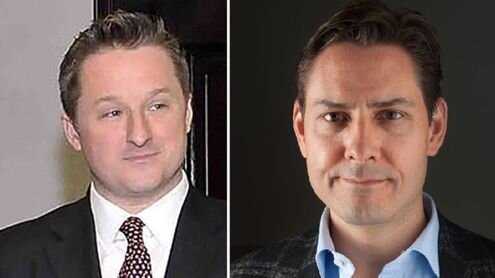By Jerome A. Cohen
Michael Spavor (L) and Michael Kovrig
After 557 consecutive days of incommunicado interrogation and incarceration, China has finally indicted two Canadians, Michael Kovrig and Michael Spavor, with varieties of espionage. The Globe and Mail has a good article on these terrible cases. The SCMP has also published an article on the charges. Both articles raise more questions than the PRC is prepared to answer, and these questions relate to today’s focus on the content of the forthcoming National Security Law for Hong Kong, especially the hot issue of foreign and external “collusion.”
One basic question is the extent to which the cases of the “two Michaels” are linked. Last year, China’s powerful Central Party Political-Legal Commission claimed that Spavor, the businessman, had provided intelligence to Kovrig, the International Crisis Group researcher. That might well be plausible since Kovrig would obviously want to be in contact with all sorts of people, particularly ones who knew a lot about North Korea and its relations with China. Yet their relationship does not appear to be an important part of either case, so far as we can tell. The two cases do not appear to be legally linked at this point. They are not being prosecuted together, the charges seem to be somewhat distinct so far as news accounts discern, and they are not even being prosecuted in the same city. Intriguingly, Spovar may be charged with sending secrets to the DPRK as well as Canada, which may be why his case is now based near the Korean border.
Yet it is obvious from the circumstances of their common connection to Sino-Canadian relations and the US attempt to extradite from Canada Huawei’s CFO, Ms. Meng, as well as from some PRC diplomatic statements and publicity, that the cases are politically linked to each other and to the extradition case. This is not simply the usual PRC practice of illegal arbitrary detention that violates both Chinese and international law but it is also a more extraordinary example of international “hostage diplomacy.”
Of course, the two cases are both being legally processed in a similarly unfair fashion. Now that indictments have been handed down, the defendants are likely to finally have Party-approved lawyers appointed for them, not chosen by them. Until now, they reportedly have been denied the right to see any lawyer. Until the coronavirus pandemic, they did have monthly very brief visits from a Canadian consular official, but these have inevitably been of limited assistance since PRC rules ridiculously do not allow any discussion of the case that is the cause of the visit!
I strongly disagree with the statement by Gordon Houlden, a former Canadian diplomat quoted in the Globe and Mail article, to the effect that indictment makes it more difficult, but not impossible, for the Chinese leadership to intervene in the judicial process. In defense of the reputations of both the Party and the courts, I can confirm, from many personal experiences assisting in similar human rights cases in China, that the power of the Party over the courts never diminishes, even in the final stages of death penalty cases, as indeed the current Schellenberg case illustrates. In the infamous Gao Zhan case, for another example, the US State Department and the PRC Foreign Ministry quietly agreed that, immediately after her sentence to 10 years in prison, she would be released, allegedly for medical treatment in the US. Her husband and I waited an anxious 48 hours before the deal was carried out.
Schellenberg’s Chinese lawyer, Zhang Dongshuo, also quoted by the Globe and Mail, offers a more accurate version of how the two Canadian cases will secretly unfold, predicting that it “won’t proceed openly, there will be no observers and the verdict and case information won’t be made public.” Actually the verdict, in the sense of the court’s sentence, will very likely be made public, but the court’s opinion will be withheld, in order to deny observers insight into the judicial process and the facts. The future timelines of the cases and the fates of the two ill-fated hostages are still incredibly uncertain. Evidently, the current PRC leadership has no shame when it comes to human rights and international law.

